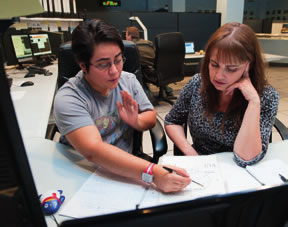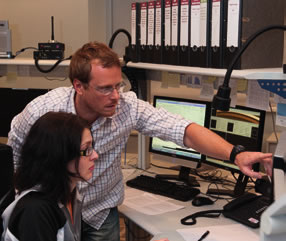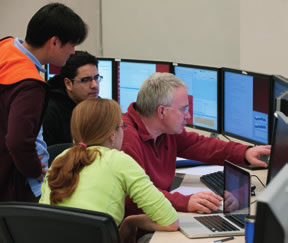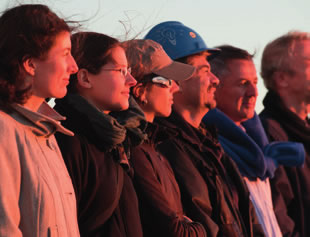Share
Working at ESO
Are you interested in working in areas of frontline technology and in a stimulating international environment? Do you feel your profile matches our requirements? Learn more about our current vacancies and apply online. Read more..








The European Organisation for Astronomical Research in the Southern Hemisphere (ESO) is the foremost intergovernmental astronomy organisation in Europe and the world's most productive ground-based astronomical observatory. ESO carries out an ambitious programme focused on the design, construction and operation of powerful ground-based observing facilities enabling astronomers to make important scientific discoveries.
ESO operates three unique world-class observing sites in northern Chile: La Silla, Paranal and Chajnantor (home to ALMA and APEX), and the ESO Headquarters are located in Garching, near Munich, Germany.
At Paranal, ESO operates the Very Large Telescope, the world's most advanced visible-light astronomical observatory, and will host and operate the southern array of the Cherenkov Telescope Array, the world's largest and most sensitive high energy gamma-ray observatory. ESO is a major partner in ALMA, the largest astronomical project in existence. And on Cerro Armazones, ESO is building the 39-metre Extremely Large Telescope (ELT), which will become "the world's biggest eye on the sky" and whose operations will be fully integrated into the Paranal Observatory.
For its APEX project, within the Directorate of the La Silla Paranal Observatory, ESO is advertising the position of
Telescope and Instruments Operator
Sequitor, San Pedro de Atacama
Deadline 16/06/2019
The Atacama Pathfinder Experiment (APEX) is a forefront sub-mm single dish telescope located in the high Andes, on the Llano de Chajnantor at 5100 m.a.s.l. The APEX telescope hosts a suite of cutting-edge mm and sub-mm instrumentation, including single and multi-pixel heterodyne instruments as well as bolometer cameras (http://www.apex-telescope.org). The APEX project is a collaboration between the Max Planck Institut für Radioastronomie (MPIfR), ESO and the Onsala Space Observatory. The Science Operations team comprises staff astronomers, telescope and instrument operators and observing specialists.
The successful candidate will be part of the APEX project and he/she will contribute to the scientific operation of the APEX observatory, giving support to external multinational teams coming to observe with the APEX telescope.
Main Duties and Responsibilities:
We seek for a telescope and instrument operator for APEX observatory. He/she will join a team of scientists, engineers, and technicians, in total 19 people. He/she will be responsible for the operations and maintenance of the antenna, support observations in service mode, develop calibration and quality control procedures for the instruments, control the configuration of the system, and develop operation procedures for the telescope. The main tasks of the successful candidate will include:
- Operate the telescope and instruments (from the base station as well as from the Chajnantor site at 5100m) in collaboration with an astronomer, but also independently following preset guidelines prepared by astronomers. Daily observing shifts last 8 hours and rotate during the year between morning, afternoon and night shifts.
- Reduce the collected data and contribute to the initial quality assurance.
- Log and document the conducted observations, observing downtimes, or issues found.
- Train visiting astronomers for observations at APEX and be a contact point for observations.
- Monitor the performance of instrumentation, the antenna system as well as the observing software, reporting issues found during operation and participating in their troubleshooting, in collaboration with staff astronomers and engineers.
- Design, develop, implement and maintain software tools useful for the operation (observation preparation, data reduction, monitoring, etc.), in collaboration with other members of the team.
- Participate in the commissioning of instruments.
- Occasionally perform regular maintenance of instruments, including cryogenic refills.
Reports to:
As a member of this group, the Telescope and Instrument Operator will report to the Head of Science Operations.
Key Competences and Experience:
Team working skills:
- Contributes with ideas for improvements and developments to pursue common team goals.
- Has a flexible attitude to team roles; shares and documents own knowledge, experience and skills to enable others to meet team and organizational goals.
- He/she feels comfortable working as part of a team, sharing responsibilities and proactively interacting with other team members.
Self-development skills:
- Develops own skills and ensures that learning and development needs are identified, solutions found, and outcomes evaluated.
- Ability to autonomously carry out tasks and small projects.
- High sense of responsibility in the delivery of tasks on time and according to the required standard.
The candidate should have, at least in two of the following areas, a profound experience in:
- Data analysis (statistical analyses, data mining, trend analysis);
- Machine learning and AI techniques;
- Database administration and handling;
- Multi-system software/hardware communication (e.g. CORBA);
- Object-oriented and scripting programming (e.g. in Python, PHP, JavaScript);
- System or network administration under LINUX;
- RF electronics.
Qualifications:
We seek a professional with a solid background in Physics, Astronomy, Computer Science, Electronic Engineering or equivalent. A university degree and/or experience in telescope and instrument operations would be an asset but it is not a requirement. Candidates should have the ability to work independently as well as members of the team. The successful candidate is also required to have a valid driver's license.
Language Skills:
As ESO is an international organization where the official language is English, it is required that the candidate has a good command of written and spoken English.
Remuneration and Contract:
We offer an attractive remuneration package including a competitive salary, educational and other social benefits, as well as financial help in relocating your family (if needed). The initial contract is for a period of two years with the possibility of an indefinite extension, subject to evaluation. The title or grade may be subject to change according to qualification and the number of years of experience.
Duty Station:
The duty station is APEX site (Sequitor near San Pedro de Atacama). The working schedule is typically 8 days on duty followed by a 6 days rest period (8/6) with accommodation provided on site.
Career Path:
IV
Application:
If you are interested in working in areas of frontline science and technology and in a stimulating international environment, please visit http://www.eso.org for further details. Applicants are invited to apply online at http://recruitment.eso.org/. Applications must be completed in English and should include a motivation letter and CV (in English).
Deadline for applications is 16 June 2019.
Interviews are expected to start soon after this date.
No nationality is excluded, however non-Chilean applicants must have the pertinent working permit, according to Chilean regulations, at the time of the application. The post is equally open to suitably qualified candidates irrespective of gender, age, disability, sexual orientation, race or religion.
